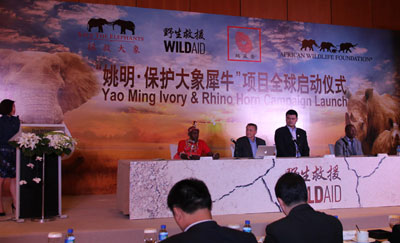In the most unsustainable business possible, poachers are decimating elephant herds in Africa, reaching levels not seen since the ivory trade was made illegal in 1989.
A heart-breaking 20,000 elephants have been killed this year (and the past several years) and 668 rhinos, precipitous increases from just a few years ago. If this isn’t stopped, African rhinos and elephants could be extinct during our lifetime.
Entire herds of elephants have been massacred at once, including mothers and children.
The World Wildlife Fund and other nonprofits are now using drones to deter and find poachers before they kill animals.
Today, former NBA star and Chinese icon, Yao Ming, launched a campaign to raise awareness of this in China, where most ivory and horn trinkets are sold.
He’s doing so in
partnership with WildAid, Save the Elephants, African Wildlife Foundation, and
the Yao Ming Foundation.

Chinese Public Unaware
Interestingly, a recent survey finds that the Chinese public is very supportive of wildlife protection and is not aware of poaching for ivory.
94% of those surveyed agree the "Chinese government should impose a ban on the ivory trade"
and 95% agree the "Chinese government should take stricter action to prevent use of
rhino horns."
Here are some of the huge misconceptions Chinese research company, HorizonKey, found in the survey:
- More than half of those surveyed believe elephant
poaching is not common; - 34% believe ivory is obtained from natural elephant mortality;
- Only 33% believe elephants are poached for their tusks and rhino horn comes from poached rhinos;
- Nearly 50% believe rhino horn can be legally purchased from official stores.
After the international trade in ivory was banned, elephant populations increased to about a million, but then some African countries decided to do a one-off sale in 2008
to get rid of ivory that had been held in inventory. That was a bad mistake – it re-opened markets for "legal" ivory.
When the 1989 ban was enacted, elephant populations in Africa had dwindled from millions in the mid-20th century to around 600,000.
There are now an estimated 472,000 elephants, whose survival is also threatened by human population encroaching on their habitat.
"Rhinos are not threatened by loss of
habitat, they are threatened by poaching for their horns for Asian markets.
African Wildlife Foundation has been rapidly investing in key target landscapes
across Africa to ensure that critical rhino populations are protected, through
measures such as aerial surveillance, rapid-response teams, and more and
better-equipped boots on the ground."
Kenya is a key transit point for smuggled ivory, seizing two tons in January. The government plans to toughen fines and sentences for convicted poachers and smugglers. Last month, a Chinese smuggler was fined less than a dollar a piece, reports Phys.org.
"Elephants and
rhinos are conservation flagships, national icons, goodwill ambassadors, and
generate hundreds of millions of tourist dollars for African economies funding
education and development; they are the pandas of Africa. We have seen illegal
markets collapse in the face of strong clear laws, enforcement efforts, and
consumer awareness campaigns in the past. By strongly implementing these proven
measures, China could become a world leader in wildlife conservation and help
save elephants and rhinos."
Yao’s previous WildAid campaign on shark fins, backed extensively by
Chinese media, is credited with reducing consumption by 50-70%.
"No
one who sees the results firsthand, as I did, would buy ivory or rhino horn. I
believe when people in China know what’s happening they will do the right thing
and say no to these products,"
says Yao.
"Nor do young elephants develop secure social relationships when living in a state of terror, or mourning slain family members – and elephants do mourn. When mothers are killed, babies still dependent on their milk die slowly from starvation, heartbroken and alone. We increasingly see groups of young elephants without knowledgeable females accompanying them. Lost with these matriarchs are traditions and collective memories passed down through many thousands of generations that guide their offspring to that isolated salt lick or patch of fruiting trees that helped to sustain them," say Samantha Strindberg and Fiona Maisels of the Wildlife Conservation Society in the NY Times.
Poaching is big business, involving organized-crime cartels every bit as ruthless as those trafficking narcotics, arms and people. Existing international laws against money laundering should be used to follow the money trail and to prosecute these criminals," they conclude.
Learn more and watch the PBS special, Battle for the Elephants:

About time and kudos to Mr. Ming. Decreasing the demand in China will go a long way toward reducing poaching, starting with education.